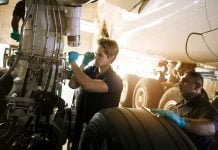The aeronautical engineer uses his own artist’s palette for possibilities as opposed to a palette of hues. The performance of his aircraft or flight vehicle depends on how he combines these engineering alternatives on his technical palette and applies these to his canvas (design). These flying aircraft were created by aeronautical engineers. One must complete a B.Tech, to qualify as an aeronautical engineer (Aeronautical).
What is aeronautical engineering and what do these engineers do?
Converting design to software, or turning the researched concept into reality, entails testing the concept in relevant software, manufacturing, and ultimately computing its system performance in flight. This is the focus of a B.Tech in Aeronautical Engineering.
Examining the aerodynamic and structural forces operating on the machine that he developed is a part of aeronautical engineers’ job descriptions. Before an aircraft is delivered to the operator, a series of test flights are conducted on it to acquire data on the flying equipment. Aeronautical engineers also are involved in this process.
These students also participate in the planning, running, and maintaining of the aircraft. Aeronautical engineers play a significant role in both civil aviation occupations and aviation jobs in the defence industry.
The only area of engineering that has not yet been fully investigated by humans is aeronautical engineering. Humans from many nations have already begun their exploring activities. Join us on this thrilling adventure to the moon and far beyond the skies, where the sky is only the starting point but not the end of what aeronautical engineers can accomplish.
What does it take to qualify for admissions?
The applicant must have at least a 10+2 in Physics, Chemistry, and Mathematics. Students may also apply if they choose any other elective subject in lieu of chemistry. Consider substituting computer science, together with physics and mathematics, for chemistry.
3 years of engineering school in the appropriate field. Diplomas in mechanical, production and industrial, electronics and communication, electronics, instrumentation and control, telecommunication engineering, and aeronautical engineering, for example. Students who meet this requirement can lateral enter the second year of the aeronautical engineering programme.
B.Sc. in mathematics, physics, and chemistry. Students who meet this requirement can lateral enter the second year of the aeronautical engineering programme.
According to AICTE guidelines, candidates must have at least 45% in PCM or an equivalent subject in their 10+2 or in one of the other prerequisites listed above.
Conclusion: some of the top engineering colleges demand students to clear the basic requirements, along with some special skills. Some of the skills are good technical ability, a great grasp at math and physics, mechanical abilities etc.
A candidate should also have certain personality traits such as leadership qualities along with the quality to be able to work as a team. One needs to be responsible and have basic problem solving skills. Aeronautical engineering is a growing field and provides tonnes of opportunities for a student to grow and earn at the same time. As a result of this it’s becoming one of the most popular fields of study.










